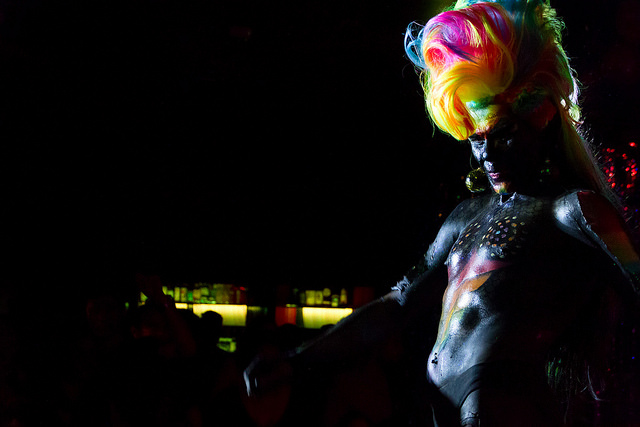I’ve always thought that queerness was about living and thriving in the margins. It’s about fighting for rights, right? And ‘rethinking relationships’, and challenging dominate ideas about the body. Evidencing the pervasiveness of this idea, many members of the Lesbian, Gay, and Bisexual community worry about the future of queer culture after so-called “marriage equality”*. But, what if queer culture is actually not inherently subversive, but is in-fact another organising system which privileges and proliferates certain identities whilst silencing others?
At the Health In Difference Conference held in Canberra this year, there were a number of workshops facilitated by Tekwabi Giz, the Indigenous delegation who spoke of the colonising effects of queer discourse. While western sociobiological understandings of queer experience often universalise the experience of gender and sexuality, this group reiterated that the concept of biology as destiny does not form the basis of identity for many. Furthermore, as gender is understood differently by each culture, conceptions of being transgender are not directly translatable to the experiences of being gender diverse in any other culture. For example, people who are Brotherboy or Sistergirl are often forced into boxes that do not explain the way in which they conceive themselves. As Crystal, a Sistergirl from the Tiwi Islands put it “[being] Sistergirl isn’t just about gender, it’s about your spirit too”.
Brett Mooney from Two Spirits, an advocacy organisation that operates from the Queensland AIDS Council, pointed out that a struggle against hegemonic cultures was a common theme between Indigenous and queer cultures. Both communities suffer from the dominant culture’s fear of genuine engagement in these discussions due to a fear of being ‘culturally insensitive’. The idea that culture is something only Indigenous people, queer people, or other minorities, possess is othering. Hegemonic western culture is not a point from which all other cultures should be compared. Instead, Brett prefers to engage with all people who visit Two Spirits by acknowledging that culture is something everyone possesses, “it is getting up in the morning and knowing what to do next”. The phrase used by Tekwabi Giz, “we are still here, and we are still fighting”, highlights that queer and Indigenous communities continue to be influenced by transgenerational trauma inflicted by discrimination and violence. This trauma is often used to explain, for example, the higher rates of mental health issues shared by these communities. By their marginalisation, the intersectional nature of western queer and Indigenous cultures is clear.
Despite their connections, what western queer cultures often fail to recognise is that language and experience, despite what the vocal ‘Born This Way’ movement advocates, are not culturally universal. For example, in discussions on non-binary identities, the first barrier to Indigenous delegates answering a question from the audience was the use of the term ‘binary’ – one that is not necessarily easily translatable. Therefore, the concept of non-binary identities as a category to be discussed was not immediately clear, highlighting how these revolutionary ideas are still part of a dominant cultural discourse. Another common mistake that Leonie Pihama, a Maori person from Aotearoa (New Zealand), used to articulate the neo-colonial power of language and queer identity is the ‘pronoun round’. In many queer groups, pronoun rounds (where, before a meeting, each person announces to the group their preferred pronoun) are held up as the inclusionary way to ensure gender diverse people are respected. However, amongst a group of queer Maori people, a pronoun round using the terms ‘he/she/they’, according to Leonie, is a symbol of colonisation in the way that is displays the need to use a language and an understanding of gender of the colonisers to legitimise a queer identity. As she explained, “a definition of Maori sexuality….I don’t even know if that exists. I know how Maori views sexuality in terms of whakapapa, connection to everything including nature is different to some cultures, but I don’t know whether there is actually a definable Maori sexuality”. The very notion of ‘sexuality’ is not a concept broadly applicable, but part of a dominant western discourse on human experience. These interactions made me see that using queer discourse may be emancipating for some people, including some Indigenous people, but it can also be exclusionary.
In order to be truly queer, as defined by my opening comment, our communities should be reconsidering the ways in which our languages, ways of understanding desire and relationships, are exclusionary. As Kai Clancy, a Brotherboy from Queensland, pointed out, “decolonisation isn’t just a practise for Indigenous people, it is a job for everyone”. The challenge of rethinking and learning is important for the health of our shared struggles. As Brett said, “there is nutrients in humble pie, savour the crust”.
_______________________________________________________________________________________________________________________
*Don’t fear, there are many more struggles for the queer identity to thrive on… see above.
With gratitude to the Indigenous delegates of the HID Conference, those specifically named and those whose presence and thoughts filled me with humble pie.

